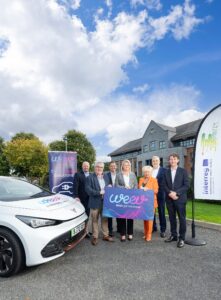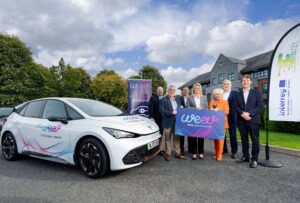14th September 2023: Louth County Council and East Border Region Ltd have announced the appointment of Weev to install and operate 25 rapid electric vehicle chargers at locations across the border region in the Republic of Ireland. The award, which followed a competitive tender process will see motorists in counties Donegal, Sligo, Leitrim, Monaghan, Cavan, Louth and Meath being able to avail of these new chargers later this year.
These new chargers will be installed as part of the FASTER Project which has received €6.4 million EU funding under the INTERREG VA programme. The project is managed by the Special EU Programmes Body (SEUPB) to support the transition to electric vehicles and sustainable transport use across Western Scotland, Northern Ireland and the Republic of Ireland (Border Region). Match funding for the project has been provided by the Department for Infrastructure (Northern Ireland) and the Department for Transport (Republic of Ireland) and Transport Scotland.
Initial groundworks are already in progress and the chargers are expected to be operational in the coming months in what will be a welcome boost to the public charging network in the border region.
Discussing the appointment of Weev to deliver this much needed infrastructure, Joan Martin, Chief Executive Officer, Louth County Council said;
“Today marks the beginning of the FASTER Project at 14 locations across 7 counties. It is the result of much cross border cooperation over recent years between ourselves and our colleagues from East Border Region and Ulster University in Northern Ireland and HITRANS in Scotland.
When completed the FASTER Project shall have delivered 25 high quality Rapid car charge points from Navan in County Meath to Buncrana in County Donegal. It will bring a much needed upgrade to the car charging infrastructure along the border counties in the Republic of Ireland. With our construction partners WEEV and M&M Construction this promises to be just the beginning of new Rapid EV Car Charging Infrastructure being installed across the island. I am delighted that the funding from INTERREG has been secured for this project and look forward to it coming to fruition in the near future.”
Founded in 2022, Belfast-based Weev was set up in response to the critical need for improved electric vehicle (EV) charging infrastructure across Ireland.


Philip Rainey, Chief Executive Officer, Weev added;
“Our vision as a company is to supercharge EV infrastructure where it is most needed and this project allows us to do just that.
There is not doubt that EV drivers in the border counties are among the most under-served anywhere in the country. By partnering with Louth County Council and East Border Region Ltd, we can put the region back in the fast lane towards greater sustainability and accelerate the adoption of EVs in the area.
We look forward to rolling out the charging hubs in the coming months and welcome new locations, drivers and businesses to our rapidly expanding network.”
East Border Region Ltd, is the lead partner on the FASTER Project and Councillor Terry Andrews Chair, who is also a member of Meath County Council welcomed the appointment of WEEV saying;
“EBR is delighted to lead this innovative and genuinely cross border project which will see essential EV infrastructure installed in Ireland, the border counties and Scotland. Electric vehicles are an essential component of the strategy to reduce emissions and help improve local air quality.
The FASTER project will undoubtedly contribute to this aim. We look forward to the rollout of the 25 rapid charge points and to working with our colleagues across the border Counties and Weev in the implementation phase of the project”.
Gina McIntyre, Chief Executive of the Special EU Programmes Body (SEUPB), said: “We are delighted that 25 new rapid electric vehicle chargers will be installed across the Border Counties. The rapid chargers are a step-up in enhancing accessibility to EV charging; with drivers spending less time charging, this will encourage more motorists to transition to electric vehicles. Currently the ownership of EVs is limited to people who have driveways. The new charging points will give access to drivers everywhere, regardless of whether they have a driveway or not, therefore opening access to everyone.”
Further information about the FASTER Project can be found online now at www.fasterevcharge.com